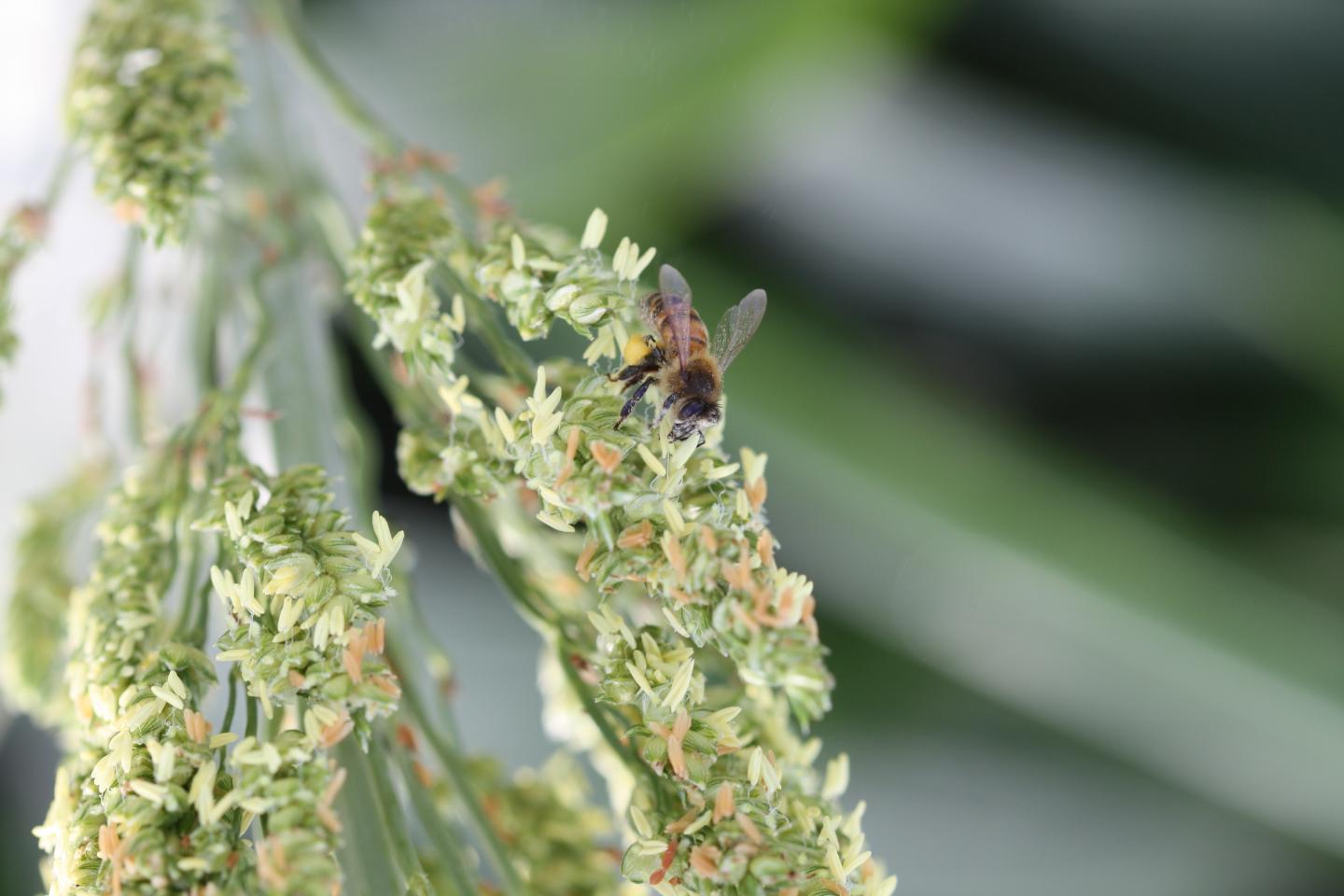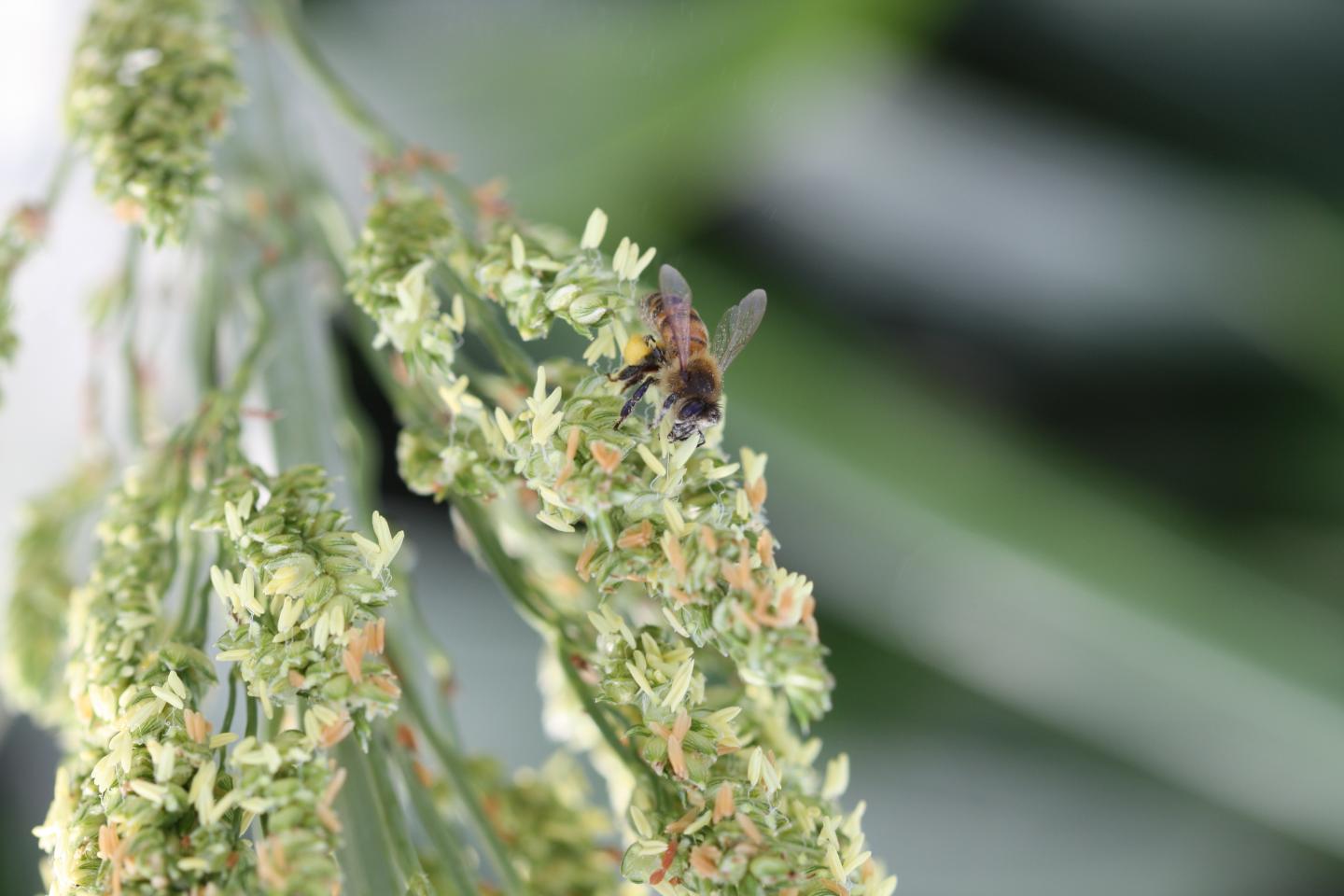
Credit: Scott Stewart
JACKSON, Tenn. – While recent media reports have condemned a commonly used agricultural pesticide as detrimental to honey bee health, scientists with the University of Tennessee Institute of Agriculture have found that the overall health of honey bee hives actually improves in the presence of agricultural production.
The study, "Agricultural Landscape and Pesticide Effects on Honey Bee Biological Traits" which was published in a recent issue of the Journal of Economic Entomology, evaluated the impacts of row-crop agriculture, including the traditional use of pesticides, on honey bee health. Results indicated that hive health was positively correlated to the presence of agriculture. According to the study, colonies in a non-agricultural area struggled to find adequate food resources and produced fewer offspring.
"We're not saying that pesticides are not a factor in honeybee health. There were a few events during the season where insecticide applications caused the death of some foraging bees," says Mohamed Alburaki, lead author and post-doctoral fellow with the University of Tennessee Department of Entomology and Plant Pathology (EPP). "However, our study suggests that the benefits of better nutrition sources and nectar yields found in agricultural areas outweigh the risks of exposure to agricultural pesticides."
Alburaki and fellow researchers established experimental apiaries in multiple locations in western Tennessee ranging from non-agricultural to intense agricultural production. Over the course of a year, colonies were monitored for performance and productivity by measuring colony weight, brood production and colony thermoregulation. Colony thermoregulation, or the ability to maintain an optimal temperature within a hive, is an important factor in brood development and the health of the resulting adult bees.
According to the study, hives located in areas with high to moderate agricultural vegetation grew faster and larger than those in low or non-agricultural areas. Researchers suggest the greater population sizes enabled better colony thermoregulation in these hives, as well.
Meanwhile, bees located in a non-agricultural environment were challenged to find food. Although fewer pesticide contaminants were reported in these areas, the landscape did not provide sustainable forage. In fact, during the observations, two colonies in the non-agricultural areas collapsed due to starvation.
Disruptions and fluctuations in brood rearing were also more notable in a non-agricultural environment. Interestingly, brood production was highest in the location that exhibited a more evenly distributed mix of agricultural production, forests and urban activity.
"One possible explanation for this finding could be the elevated urban activity in this location," says Alburaki. "Ornamental plantings around homes or businesses, or backyard gardens are examples of urban activity that increase the diversity of pollen in an area. Greater pollen diversity has been credited with enhancing colony development."
Researchers also evaluated trapped pollen from each colony for pesticide residues. Low concentrations of fungicides, herbicides and insecticides were identified, but at levels well below the lethal dose for honey bees. Imidacloprid was the only neonicotinoid detected, also at sub-lethal levels.
Agricultural pesticides, particularly neonicotinoids, are considered by some to be a key factor in declining honeybee populations. The UTIA study found that higher exposure to pesticides in agricultural environments did not result in measurable impacts on colony productivity.
"We train agricultural producers on careful selection and conscientious application of pesticides to reduce bee exposure," says Scott Stewart, Integrated Pest Management Specialist with UT Extension, "but it's becoming more clear that the influences of varroa mite and food availability are more important factors in honey bee health than agricultural pesticides."
###
This study was supported in part by the U.S. Department of Agriculture's Agricultural Research Service Pest Management Program.
Through its mission of research, teaching and extension, the University of Tennessee Institute of Agriculture touches lives and provides Real. Life. Solutions. ag.tennessee.edu
Contacts:
Mohamed Alburaki, post-doctoral research associate
UT Department of Entomology and Plant Pathology
731-425-4718
[email protected]
Ginger Rowsey
UTIA Marketing and Communications
731-425-4768
[email protected]
Media Contact
Ginger Rowsey
[email protected]
731-425-4768
@UTIAg
http://ag.tennessee.edu
############
Story Source: Materials provided by Scienmag





